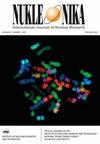在激光等离子体周围的低密度气体中形成的低温等离子体的研究
IF 0.3
4区 物理与天体物理
Q4 CHEMISTRY, INORGANIC & NUCLEAR
引用次数: 0
摘要
低温等离子体的产生是利用高强度极紫外(EUV)和软x射线(SXR)脉冲进行光电离的结果。这种类型的等离子体也存在于外层空间,例如北极光。当高速物体进入大气层时也会发生高温,在此期间,局部的摩擦会产生高温。低温等离子体也在热激光等离子体(LPP)周围的环境气体中形成。在这项工作中,已经准备了一个特殊的系统来研究这种类型的等离子体。LPP是在一个充满气体的低压室中产生的,在1-50毫巴的数量级下,通过激光脉冲(3-9 J, 1-8 ns)聚焦在气体喷涌目标上。在这种情况下,LPP发射的SXR/EUV辐射部分被低密度气体吸收。在这种情况下,高温等离子体和低温等离子体(分别为~100 eV和~1 eV)在腔室内局部产生。对euv诱导等离子体的研究主要采用紫外/可见光谱方法。测量使用了梯级光谱仪,另外,时空测量使用了光学条纹相机。谱分析由PGOPHER数字代码支持。本文章由计算机程序翻译,如有差异,请以英文原文为准。
Investigation of low-temperature plasmas formed in low-density gases surrounding laser-produced plasmas
Abstract Low-temperature plasma production is possible as a result of photoionization using high-intensity extreme ultraviolet (EUV) and soft X-ray (SXR) pulses. Plasma of this type is also present in outer space, e.g., aurora borealis. It also occurs when high-velocity objects enter the atmosphere, during which period high temperatures can be produced locally by friction. Low-temperature plasma is also formed in an ambient gas surrounding the hot laser-produced plasma (LPP). In this work, a special system has been prepared for investigation of this type of plasma. The LPP was created inside a chamber filled with a gas under a low pressure, of the order of 1–50 mbar, by a laser pulse (3–9 J, 1–8 ns) focused onto a gas puff target. In such a case, the SXR/EUV radiation emitted from the LPP was partially absorbed in the low-density gas. In this case, high- and low-temperature plasmas (Te ~100 eV and ~1 eV, respectively) were created locally in the chamber. Investigation of the EUV-induced plasmas was performed mainly using spectral methods in ultraviolet/visible (UV/VIS) light. The measurements were performed using an echelle spectrometer, and additionally, spatial–temporal measurements were performed using an optical streak camera. Spectral analysis was supported by the PGOPHER numerical code.
求助全文
通过发布文献求助,成功后即可免费获取论文全文。
去求助
来源期刊

Nukleonika
物理-无机化学与核化学
CiteScore
2.00
自引率
0.00%
发文量
5
审稿时长
4-8 weeks
期刊介绍:
"Nukleonika" is an international peer-reviewed, scientific journal publishing original top quality papers on fundamental, experimental, applied and theoretical aspects of nuclear sciences.
The fields of research include:
radiochemistry, radiation measurements, application of radionuclides in various branches of science and technology, chemistry of f-block elements, radiation chemistry, radiation physics, activation analysis, nuclear medicine, radiobiology, radiation safety, nuclear industrial electronics, environmental protection, radioactive wastes, nuclear technologies in material and process engineering, radioisotope diagnostic methods of engineering objects, nuclear physics, nuclear reactors and nuclear power, reactor physics, nuclear safety, fuel cycle, reactor calculations, nuclear chemical engineering, nuclear fusion, plasma physics etc.
 求助内容:
求助内容: 应助结果提醒方式:
应助结果提醒方式:


